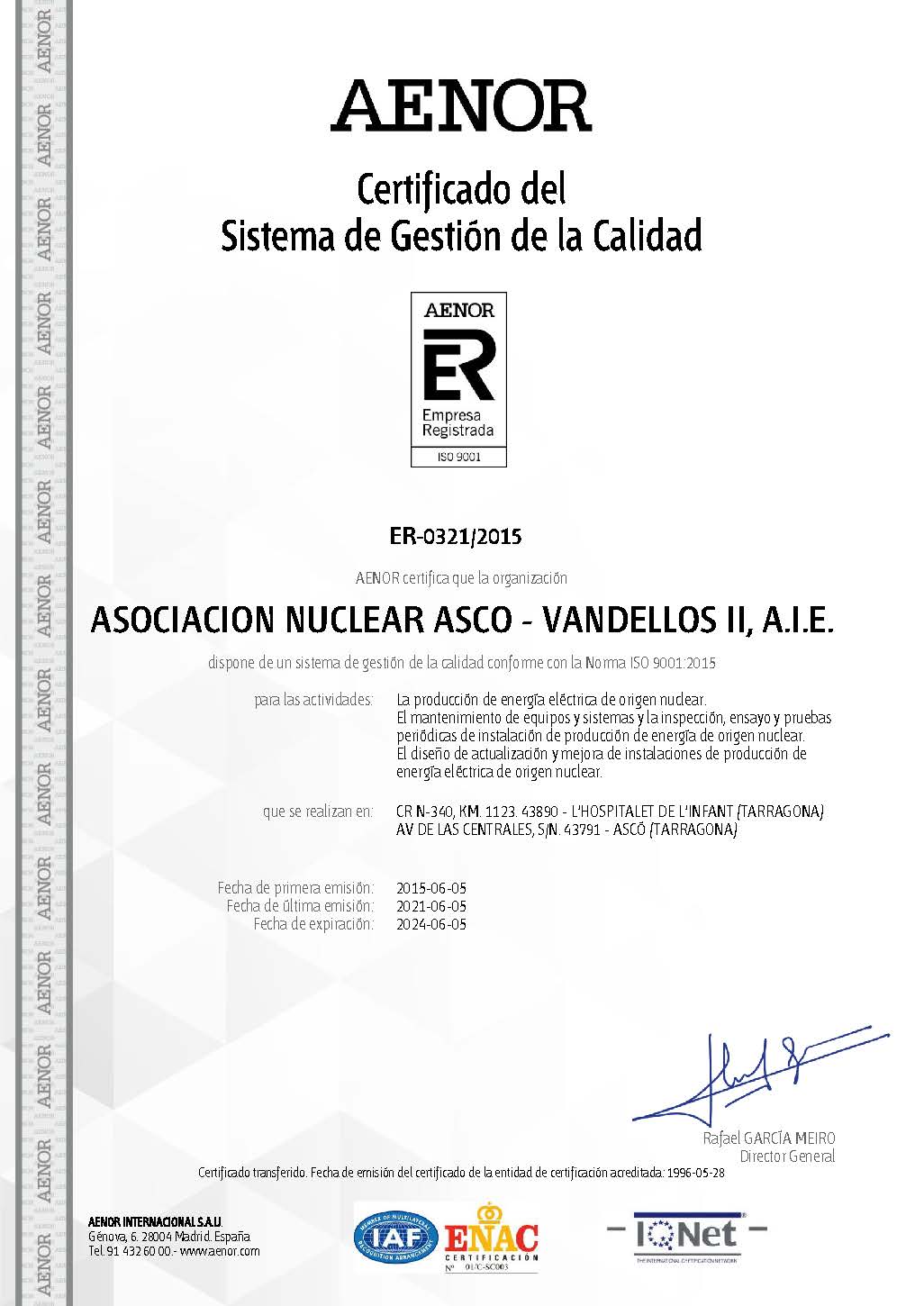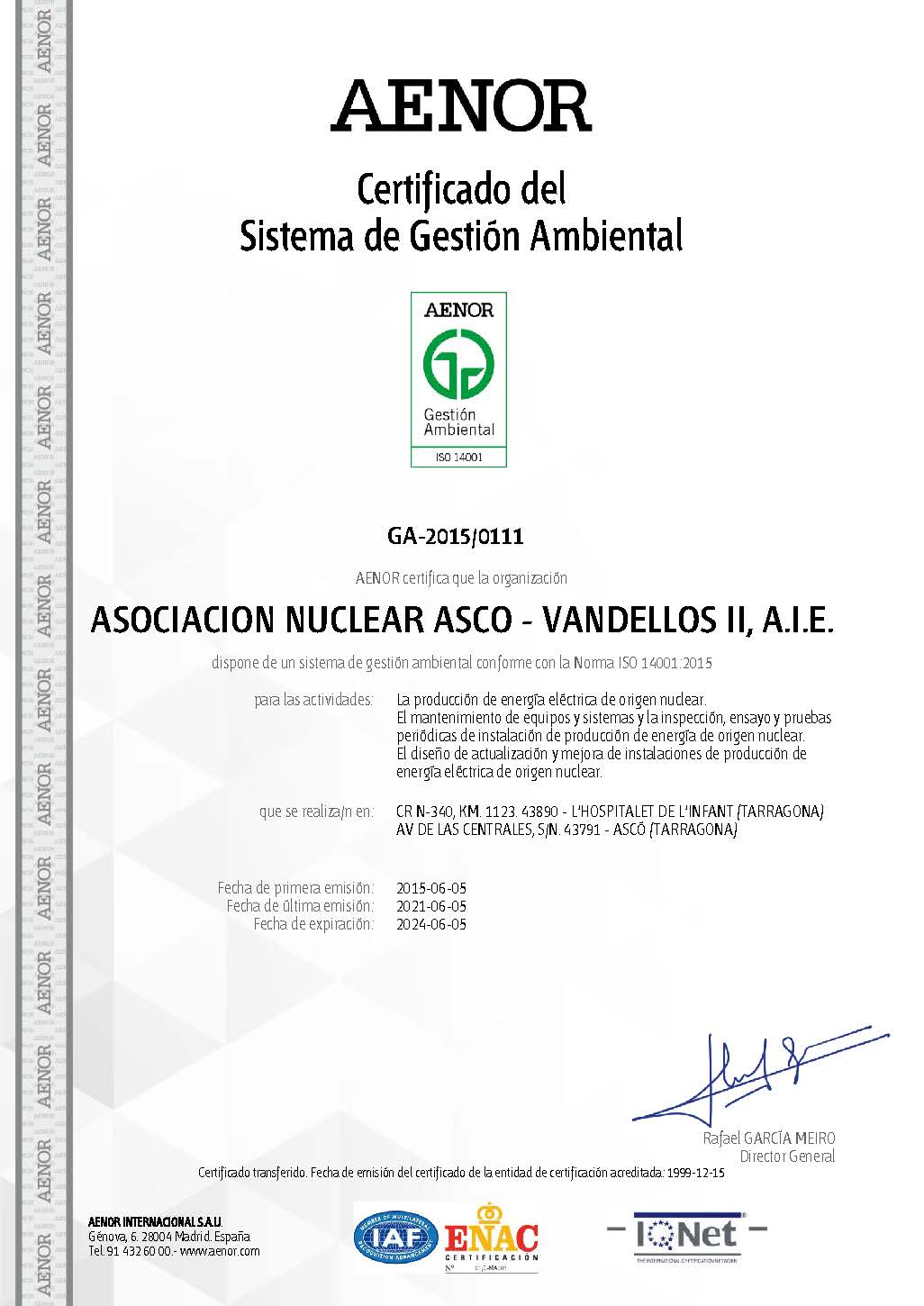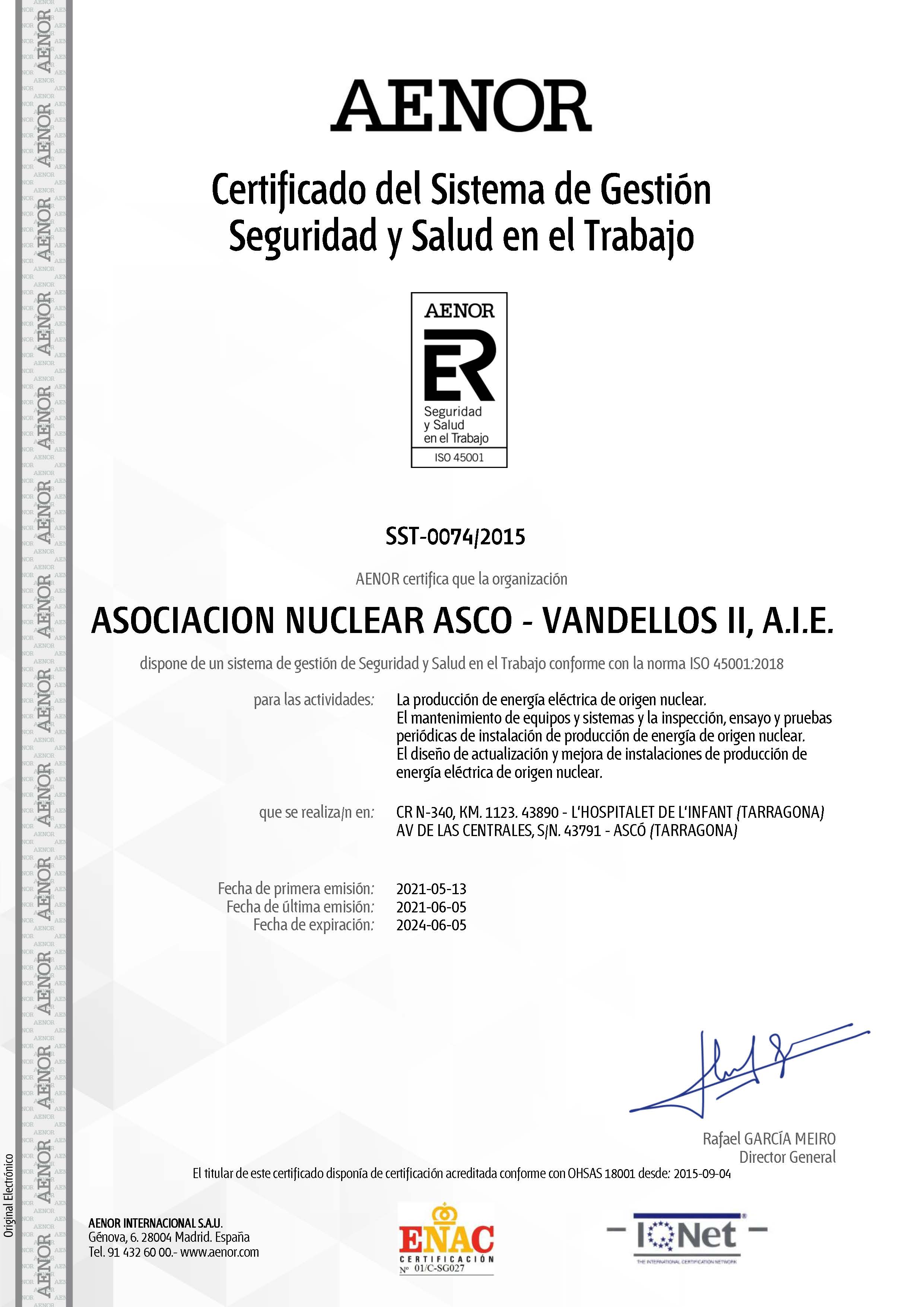ANAV’s three reactors supply approximately 50% of the electricity consumed in Catalonia and 9% of that consumed in Spain. Positive, safe and reliable energy that is fundamental for our daily lives.
positive energy
Our purpose
Reliability and technological availability point to nuclear power as one of the main sources of electricity generation in Spain. However, for ANAV (Asociación Nuclear Ascó – Vandellós II), an economic interest grouping formed by Endesa Generación and Iberdrola Generación, industrial responsibility goes beyond the robustness of the electricity supply.

Mission
To operate the Ascó and Vandellós II nuclear power plants in the long term in a safe, reliable and sustainable manner, thereby contributing to the fight against global warming.

Vision
A cohesive team of professionals, fully committed to safety culture and pursuing excellence through continuous learning and improvement.
At ANAV we know that our facilities imply having a high level of commitment to society. For this reason, our work culture prioritises safety principles, continuous improvement, transparency and respect for the environment.
We address all this with knowledge and operating experience, improving every day, training our employees, promoting team work and efficiency, and carrying out a process of continuous technological innovation. Because we are aware that only by being demanding, will we be able to make a better future for all.
Out of all the generating technologies, nuclear power sets the standards for safety and respect for the environment, since it does not emit greenhouse gases. The Ascó and Vandellós II nuclear power plants are clear examples of these values.
Policies
ANAV has defined the organisational policies that ensure that their mission, vision and values are met.
The Safety Policy is one of ANAV’s priority, and the reason for the following principles being fostered and reinforced:
- Safety is a collective responsibility.
- The focus in on safety.
- Facts, words and attitudes from the personnel and the organisation reflect this priority.
- Directors, managers and heads promote a safety conscious work environment.
- Clear prioritisation mechanisms are established, demonstrating that safety is valued above any other attribute.
- Pervasiveness of strong and healthy safety culture principles.
The Nuclear Safety Policy is based on the following principle:
- Promoting excellence in the protection of the public and workers against the risks of ionising radiations generated by the nuclear facility, by achieving appropriate operating conditions, preventing accidents and mitigating their potential consequences.
The Radiological Protection Policy is based on the following principles:
- Preventing deterministic biological effects from occurring by setting sufficiently low dose limits, so that threshold values are never reached.
- Limiting the probability of stochastic effects to values considered acceptable for the plant personnel and the public at large. To this end, all justified exposures must be kept as low as reasonably achievable, taking into account economic and social factors.
- Promoting industrial safety, health and well-being as a priority, with the joint effort of all the people who are part of the company.
- Fostering a commitment to preventing damage and health impacts, ensuring all the people who work in our facilities do so in the best physical and psychological conditions possible, understanding this as a collective and individual responsibility.
- Guaranteeing a commitment to continuous improvement in occupational health and safety management and performance.
- Strictly complying with the current occupational health and safety legislation, as well as with any other commitment subscribed by the company in addition to the legal requirements.
- Having an alcohol and drug consumption prevention and control system, applicable to all workers.
- Integrating industrial safety, health and well-being into all activities at all organisational levels, as one more individual responsibility from a personal, family and community perspective.
- Promoting attitudes and behaviours that favour an improvement in work conditions and a healthy lifestyle, obtaining the commitment of all personnel to not consume any substance that may alter their cognitive or motor skills.
- Promoting the engagement of all company employees and representatives in achieving continuous improvement in industrial safety, health and well-being.
ANAV’s Environmental Policy is based on the commitment of the entire organisation to prevent pollution, protect the environment, preserve biodiversity, promote innovation and eco-efficiency, as well as not emit greenhouse gases.
ANAV’s management is committed to ensuring the successful implementation of the Environmental Management System through a clearly defined structure for the environment and general sustainability, based on the following principles:
- Complying with the current environmental legislation and other voluntarily subscribed requirements.
- Providing specific environmental budgets.
- Implementing the Environmental Management System, respecting and preserving the natural environment, and keeping it up-to-date and internalised by the Organisation, economically efficient and periodically reviewed.
- Establishing environmental goals and objectives, with monitoring and compliance controls, and subjected to internal and external audits.
- Identifying and reducing the environmental risks, such as controlling and reducing conventional and nuclear discharges and waste, minimising the environmental impact derived from the business activity.
- Preventing environmental risks and mitigating their consequences.
- Optimising the consumption of natural resources, through sustainable use and promoting good environmental practices.
- Continuously improving the environmental management system for sustainable development, planning to adopt the best techniques available in the decisions made by the senior management with a preventive perspective.
- Keeping the environmental information documented and updated, communicating it within the organisation and making it available to the public at large and the authorities.
- Training the company personnel on environmental topics to promote sustainable development and to respect and protect the environment.
- Requiring that ANAV’s collaborators implement environmental policies, committing to the organisation’s environmental principles.
- Fostering respect for nature, biodiversity and the historical and artistic heritage around the ANAV sites.
ANAV’s Physical and Logical Security policy is based on the following principles:
- Providing protection against robbery, theft or unlawful taking of nuclear materials and radioactive sources during use, storage and transport.
- Ensuring measures are applied to locate and, if applicable, recover lost or stolen nuclear material or radioactive sources.
- Protecting nuclear facilities and materials and radioactive sources against sabotage or any other illegal action that could have radiological consequences or adversely affect or modify normal facility operation.
- Mitigating or minimising the radiological consequences of a sabotage.
- Developing and establishing strategies to define action lines focused on mitigating cyberthreats.
- Reducing the risk factor of software threats.
- Developing a set of strategic procedures and guidelines to implement controls and take actions in the event of a security incident.
- Integrating cybersecurity into the safety culture already shared by all ANAV personnel.
ANAV’s Quality Policy is based on the following principles:
- Capturing, understanding and addressing the expectations, needs and commitments made to the stakeholders (owner companies, regulatory body, utility and contractor personnel, insurance companies, national, regional and local government, nuclear industry, suppliers and the public at large).
- Communication, understood as a commitment to transparency, trust and credibility, is the fundamental vector of this relationship framework.
- Moving towards excellence through continuous improvement of processes and activities, through periodic assessment, identification of areas for improvement and definition of strategies and programmes.
- Leading and supporting actions to identify and apply best industry standards and practices on safety and quality management.
- Promoting an integrated management system focused on reinforcing safety.
- Developing and promoting engagement, responsibility, commitment and accountability, and team work.
- Ensuring that the products and processes will have the required quality and performance efficiency.
- Developing programmes and actions for workers to learn about, internalise and apply these principles in order to comply with the current legislation, applicable requirements and organisational goals.
ANAV’S Risk Management Policy is based on the following principles:
- Considering nuclear and radiological risk as the top priority.
- Defining the acceptable risk level in order to guarantee basic compliance goals, maximise profitability and preserve the assets managed by ANAV.
- Ensuring that decisions affecting risk are taken at the appropriate level and that management is actively engaged in the risk management and control system.
- Ensuring that all processes have embedded the management of all risks affecting their goals and that this management is performed appropriately for all of them.
Implementing and promoting an integrated risk management system for the organisation, with the necessary resources allocated and system effectiveness periodically measured in a continuous improvement process.
The Material Condition Policy is based on the following principles:
- Maintaining ANAV assets in excellent material condition, taking the following four elements as the basis:
- Maintenance focused on reliability of structures, systems and components.
- Quick resolution of any operating facility deficiencies.
- Long-term asset life management.
- Housekeeping of building premises and outdoor areas.
The economic management Effectiveness and Efficiency Policy is based on the following principles:
- Providing and allocating resources that prioritise the long-term safe and reliable operation of the facilities.
- Achieving effective and efficient management, understood as complying with budgets, production plans and programmes adjusted to the actual needs, is a guideline that must be applied without prejudice to the long-term safe and reliable operation of the facilities.
ANAV’s People Policy is based on the following principles:
- Providing the required staff for all ANAV processes to ensure their mission is met.
- Ensuring that all staff working in the organisation acquires the knowledge, competences and skills required to adequately perform their duties, undertaking an effective knowledge transfer to guarantee long-term operation.
- Aligning the personnel’s attitudes and behaviours with the expectations set in the prescriptive documents.
ANAV’s Knowledge Management Policy is based on the following principles:
- Having identified the knowledge that exists in the different areas of the organisation.
- Facilitating effective knowledge transfer by using, capturing and formalising it at each job position for its qualification.
- Promoting and motivating the organisation members to share, use and create knowledge as a matter of course.
- Fostering collaboration and the sharing of knowledge with universities, forums, magazines, national and international nuclear power plants, as well as with other external bodies, always with the aim of enhancing the existing knowledge for the improvement of the organisation’s goals and results.
ANAV considers sustainability as an essential element of its business culture, thus, it integrates it into its strategy, contributing to sustainable development through long-term value creation.
The purpose of this policy is to formalise and specify the principles that will guide sustainability management and the commitments for the future made to the stakeholders, which are ANAV’s framework for sustainable development.
ANAV’s commitment to sustainable management is articulated around the following basic principles of action:
- Shared long-term value creation with the owner companies and other stakeholders, with special emphasis on those related to the area where the company’s assets are located.
- Fostering an ethical and safety culture ensuring all workers act responsibly, with integrity and in accordance with the current legislation, maintaining the most advanced compliance principles, demanding the same commitment and respect for rules from the suppliers.
- Responsibility with the environment and reducing our environmental footprint in strategic decision making, company management and all activities performed throughout its life cycle.
- Driving the company’s social commitment and reaffirming its desire to contribute to the achievement of the Sustainable Development Goals, particularly the one focused on the transition to a zero-emission energy model with the aim of guaranteeing decarbonisation of the Spanish energy mix by 2050.
- Transparency as an essential value that must guide its communication and dialogue initiatives at all times, in order to establish relationships based on mutual trust with the owner companies, suppliers, contractors, as well as the regulatory body, institutions, society and other stakeholders.
- Risk management, including identification, assessment, prioritisation and treatment of risks of any nature that could affect the achievement of the organisation’s goals.
COMMITMENTS TO THE MAIN STAKEHOLDERS:
ANAV stands for maintaining a constant and fluid dialogue with its main stakeholders in order to discover and integrate their expectations in a structured manner, aligned with the company’s strategy. As a result of this dialogue, ANAV has established its main commitments to the stakeholders for the future, which are listed below:
A.- PEOPLE
The people who work for the company are our main asset. Along these lines, ANAV fosters a leadership and people management model that promotes the implementation of a culture of diversity and inclusion, innovation and collaboration, where a cross-functional vision can be provided, knowledge can be shared and synergies can be obtained as a way to operate the nuclear power plants safely and reliably, and contribute to the improvement and efficiency of the established processes.
Additionally, health and safety, whether of utility personnel or contractors, is one of the most important issues for ANAV. To this end, ANAV promotes the implementation of measures and actions to ensure work is always performed in the safest conditions. In this context, industrial safety is integrated at all organisational levels and there is a strong commitment to continuous improvement through the integrated management system, with the aim of reducing and minimising occupational health and safety risks.
B.- OWNER COMPANIES / BOARD OF DIRECTORS
ANAV has a strong commitment to provide value to the owner companies in a relationship framework that is based on the principles of loyalty and transparency. To this end, ANAV undertakes its business activity efficiently, trying to responsibly optimise the use of the available resources, in order to return profits to the companies that have placed their trust in the organisation.
C.- SUPPLIERS AND CONTRACTORS
ANAV recognises that the active engagement and collaboration of their suppliers is a key element to ensure the company effectively complies with its sustainability commitments throughout the entire supply chain. In this respect, a supplier qualification system has been established to assess elements related to health and safety, the environment, ethics, as well as technical, economic and financial, legal and repute aspects.
The company considers that guaranteeing fair conditions for the suppliers is fundamental to ensure their sustained continuity and viability over time. ANAV is committed to communicating its sustainability and ethical behaviour commitments and to help them to accept them, in order to have a responsible supply chain.
Furthermore, the company is committed to a continuous improvement of the working conditions of its collaborators, developing damage prevention and health awareness programmes involving all contractors and suppliers with the aim of working together towards the “Zero Accidents” goal.
D.- REGULATORY BODIES
ANAV attempts to maintain and foster constant and fluid communication with the regulatory bodies, based on the corporate values of ethical behaviour, enabling value to be created for all parties and establishing mechanisms that help to manage any potential social and environmental risk.
E.- PUBLIC
ANAV focuses its business activity on addressing some of the major environmental, social, economic and ethical challenges faced by society. Thus, it is fundamental for the company to maintain continuous communication and create stable and long-term relationships with society, social partners and organisations, with the aim of identifying these challenges as precisely as possible, and jointly seeking the best solutions for these challenges from an open innovation perspective, ensuring a benefit for both the company and society.
F.- NUCLEAR INDUSTRY
ANAV’s commitment to the nuclear industry revolves around a proactive involvement in different forums and associations designed to foster the sustainable development of the sector, interacting with the main agents of change in order to create shared value between the company and its environment, learn and share good practices, and strengthen stakeholder relationships.
G.- NATIONAL, REGIONAL AND LOCAL GOVERNMENT
ANAV is well aware that close collaboration and active dialogue between private and public sectors is the only possible way to reach the sustainable development goals, and address the social and environmental challenges faced by society. In this respect, the company strives to establish long-term fluid communication channels with the institutions, based on a mutual trust relationship, and ethically and transparently managed, with the intention of becoming a relevant player to achieve the Agenda 2030, the Paris Agreement and the national energy and climate commitments.
H.- INSURANCE COMPANIES
ANAV is committed to carrying out all necessary activities in order to ensure all its risks are correctly managed, including taking out an insurance with appropriate coverage for its needs and those of the environments in which it operates. Thus, transparent and fluid communication is maintained with the insurance companies regarding the different needs of the company and its activity, and any modifications on its risks, proactively collaborating in the different inspections and, if applicable, in a claim.





